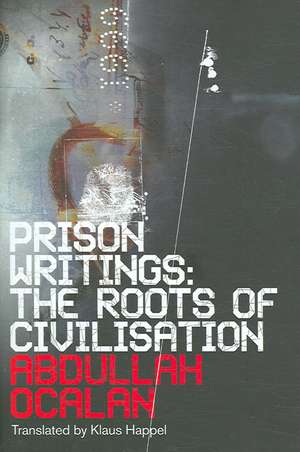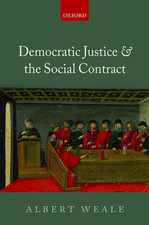Prison Writings: The Roots of Civilisation
Autor Abdullah Ocalan Traducere de Klaus Happelen Limba Engleză Hardback – 19 ian 2007
| Toate formatele și edițiile | Preț | Express |
|---|---|---|
| Paperback (2) | 154.08 lei 22-36 zile | |
| CreateSpace Independent Publishing Platform – | 154.08 lei 22-36 zile | |
| Transmedia Publishing Ltd – 31 mai 2011 | 159.12 lei 43-57 zile | |
| Hardback (1) | 416.47 lei 43-57 zile | |
| PLUTO PRESS – 19 ian 2007 | 416.47 lei 43-57 zile |
Preț: 416.47 lei
Nou
Puncte Express: 625
Preț estimativ în valută:
79.72€ • 86.62$ • 67.01£
79.72€ • 86.62$ • 67.01£
Carte tipărită la comandă
Livrare economică 21 aprilie-05 mai
Preluare comenzi: 021 569.72.76
Specificații
ISBN-13: 9780745326160
ISBN-10: 0745326161
Pagini: 320
Dimensiuni: 150 x 230 x 30 mm
Greutate: 0.65 kg
Editura: PLUTO PRESS
Colecția Pluto Press
Locul publicării:United Kingdom
ISBN-10: 0745326161
Pagini: 320
Dimensiuni: 150 x 230 x 30 mm
Greutate: 0.65 kg
Editura: PLUTO PRESS
Colecția Pluto Press
Locul publicării:United Kingdom
Notă biografică
Abdullah Ocalan is in prison in Turkey serving a life sentence. He was the leader of the Kurdish revolutionary party, the PKK. He was eventually kidnapped while abroad in 1999, and has been in prison in Turkey ever since.
Cuprins
Preface
Translator's introduction
Section 1: Slave-Owning Society and the Development of Civilisation
Introduction
1 The birth of civilisation on the banks of Tigris and Euphrates
2 The historical role of Sumerian civilisation
3 Permanent effects of Sumerian civilisation
4 Some methodological problems concerning historical development and expansion
5 The expansion and maturity of slavery
6 Tribal confederations, local and territorial states
7 Resistance to slaveholder civilisation and its reform
9 Medes, Persians and the making of the East
Section 2: The Age of Feudal Civilisation
1 The ideological identity of the feudal age
2 Islam as a revolutionary force of the feudal age
3 Institutionalisation and expansion of feudal civilisation
4 Climax and decay of feudal civilisation
5 Some conclusive remarks on Sections 1 and 2
Section 3: The Civilisation of the Age of Capitalism
1 The birth of capitalism and its new ideological identity
2 The development and institutionalisation of capitalist civilisation
3 Capitalist expansion and the climax of capitalist civilisation
4 The overall crisis of civilisation and the age of democratic civilisation
Section 4: Ideological Identity and Timespace Conditions of the New Development in Civilisation
1 Ideological identity in the third millennium
2 A new programme for the Kurdish movement
3 Reflections on strategic and tactical approaches
4 Time as a creative element
5 Global aspects and perspectives
Section 5: Can a New Synthesis of Civilisations Arise From the Cultural Traditions of the Middle East?
1 The renewal of ideological identity is a task of historic priority
2 The preconditions of a new synthesis
3 Theory and practice of Middle Eastern civil society
Notes
Index
Translator's introduction
Section 1: Slave-Owning Society and the Development of Civilisation
Introduction
1 The birth of civilisation on the banks of Tigris and Euphrates
2 The historical role of Sumerian civilisation
3 Permanent effects of Sumerian civilisation
4 Some methodological problems concerning historical development and expansion
5 The expansion and maturity of slavery
6 Tribal confederations, local and territorial states
7 Resistance to slaveholder civilisation and its reform
9 Medes, Persians and the making of the East
Section 2: The Age of Feudal Civilisation
1 The ideological identity of the feudal age
2 Islam as a revolutionary force of the feudal age
3 Institutionalisation and expansion of feudal civilisation
4 Climax and decay of feudal civilisation
5 Some conclusive remarks on Sections 1 and 2
Section 3: The Civilisation of the Age of Capitalism
1 The birth of capitalism and its new ideological identity
2 The development and institutionalisation of capitalist civilisation
3 Capitalist expansion and the climax of capitalist civilisation
4 The overall crisis of civilisation and the age of democratic civilisation
Section 4: Ideological Identity and Timespace Conditions of the New Development in Civilisation
1 Ideological identity in the third millennium
2 A new programme for the Kurdish movement
3 Reflections on strategic and tactical approaches
4 Time as a creative element
5 Global aspects and perspectives
Section 5: Can a New Synthesis of Civilisations Arise From the Cultural Traditions of the Middle East?
1 The renewal of ideological identity is a task of historic priority
2 The preconditions of a new synthesis
3 Theory and practice of Middle Eastern civil society
Notes
Index









